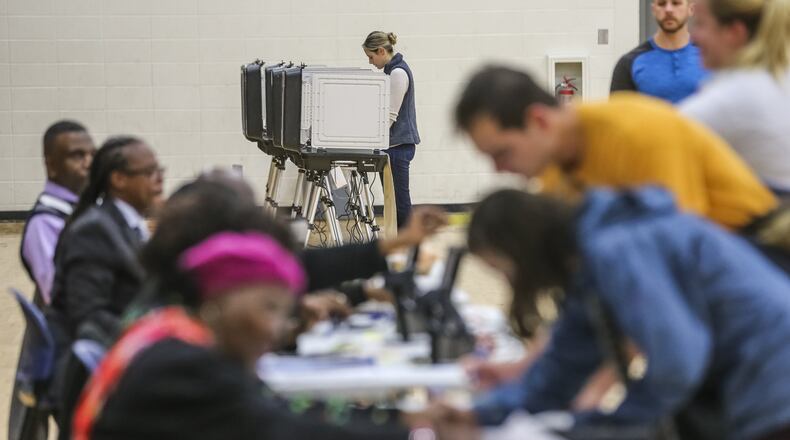Almost no one likes Georgia’s cumbersome runoff elections.
Voters have to wait nine weeks for federal runoffs after initial elections, suffering through seemingly never-ending campaigns and countless attack ads. Turnout often plunges. And taxpayers spend millions of dollars to pay the cost of staffing extra elections.
That could begin to change if the General Assembly takes action this year.
State lawmakers are considering ways to hold runoffs closer to the dates of primary and general elections, while still giving time for military and overseas voters to mail absentee ballots. Federal law requires election officials to send absentee ballots to military and overseas voters at least 45 days before a federal election.
A bill introduced by state Sen. Kay Kirkpatrick, a Republican from Marietta, would allow military and overseas voters to return absentee ballots by email or fax. She sought the legislation to make it easier for military members to vote after a friend deployed in Germany rushed to get her vote in on time.
While Kirkpatrick's bill, Senate Bill 30, wouldn't shorten Georgia's runoff period, she said it would start the discussion.
“Nobody wants to be in campaigns, either the candidates or the constituents, for nine more weeks,” Kirkpatrick said. “It’s so long because we have to allow time for those military absentee ballots to come in.”
Georgia is the last state in the nation that requires runoffs for every race where no candidate receives a majority of the vote in a general election, University of Georgia political scientist Charles Bullock said. Georgia is also one of 10 states that requires candidates to win a primary election with a majority of the votes.
In most other states, the winners are whichever candidates receive the most votes, even if they don’t exceed 50 percent of votes cast, which sometimes happens in races with more than two candidates. Legislators in Georgia aren’t considering eliminating the requirement for candidates to win a majority of votes.
Several cities and one state, Maine, have implemented a voting system called ranked-choice voting, which avoids runoffs by allowing voters to pick their second- and third-choice candidates.
Here’s how ranked-choice voting works: In an election where no candidate wins a majority, votes that went to the last-place candidate would be redistributed among the remaining candidates. Voters who supported the last-place candidate would have their votes added to the totals of their second-choice candidates. In elections with many candidates, this process would repeat until one candidate gets a majority of votes.
Bullock said state legislators could reduce the time before runoffs if they implemented ranked-choice voting for military and overseas voters, eliminating the need to wait for their absentee ballots to be mailed and returned.
Smythe DuVal, a Libertarian candidate for secretary of state who received enough support to force a runoff last fall, made ranked-choice voting a part of his campaign because it would increase political competition and save public money.
“Ranked-choice voting is a no-brainer,” DuVal said, “because when you have multiple candidates run, you’re still going to come out with a winning candidate that has a majority of support, but you don’t have to go through the expense of having another election.”
Georgians experienced a drawn-out runoff between Republicans Brian Kemp and Casey Cagle last year after no candidate received a majority in a five-way Republican primary election. After the general election last fall, statewide runoffs were held just four weeks later for secretary of state and a seat on the Public Service Commission. If there had been a need for a runoff for federal offices, that election couldn't have been held until January.
Former state Rep. Buzz Brockway, a Republican from Lawrenceville, supported ranked-choice voting when he was in the Legislature. He ran in a four-way Republican primary for secretary of state that required a runoff in July, nine weeks after the May primary.
“Legislators don’t like the long runoff, and citizens don’t either,” Brockway said. “Personally, I’d love to see us go to ranked-choice voting. It’s a more efficient way to run elections.”
Ranked-choice voting is a relatively new idea throughout the United States, with 14 cities and one state already using it, according to FairVote, a Maryland-based organization that advocates for ranked-choice voting.
Five states have enacted ranked-choice voting in some elections for military and overseas voters, all of them in the South: Alabama, Arkansas, Louisiana, Mississippi and South Carolina.
Opponents of ranked-choice voting say it’s confusing to voters, and it could result in candidates winning elections who wouldn’t have had a chance of mustering a majority otherwise.
"We need to look into eliminating the runoff because the turnout is simply too low. That's a real problem," said state Sen. Elena Parent, a Democrat from Atlanta. "We need to get rid of it, but the question is, what is the replacement going to be?"
OUR REPORTING
The Atlanta Journal-Constitution has the largest team covering Georgia’s Legislature and offers expertise on issues that matter to taxpayers. Get complete daily coverage during the legislative session at www.ajc.com/politics. Follow us on Twitter via @AJCGaPolitics and on Facebook at AJC Georgia Politics.
About the Author
Keep Reading
The Latest
Featured





